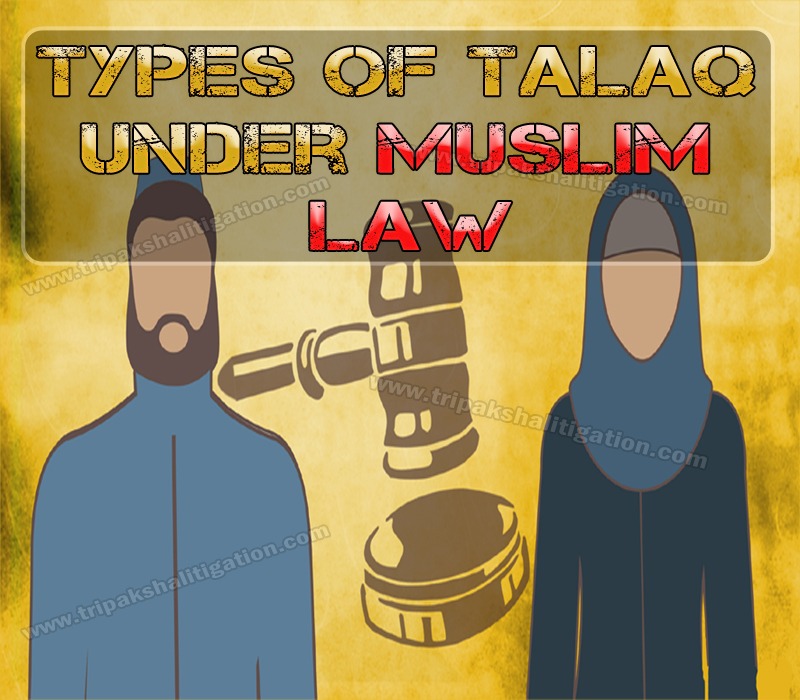What is Talaq ?
Marriage under Muslim Law is unlike Hindu marriages. Marriage under Muslim Law are in the nature of a contract and are governed by their personal law. Parties to such marriage can at anytime step away from the matrimonial obligations by pronouncing a talaq as per their personal law. Under the Muslim law the wives cannot divorce their husband on her own accord, she can only give a divorce only if her husband has delegated her right to do or that under an agreement. However the legislature has extended statutory rights to Muslim women to give divorce to their husbands under the Dissolution of Muslim Marriages Act 1939.
Therefore there can be two broad categories of divorce/talaq in Muslim Law. These types of talaq in Islam/Muslim Law are:
- Extra Judicial Divorce / Talaq in Muslim Law.
- Judicial Divorce or Talaq under Statutory Law.
EXTRA JUDICIAL DIVORCE/TALAQ IN MUSLIM LAW
The Extra-judicial divorce is when it depends upon the will of husband or wife or when it is by mutual agreement. There are different rights provided to wife and husband. Generally, rights to give divorce are given to husband only, the wife is at very lower pedestal regarding the right to divorce. Extra-judicial divorce is divided into several parts:
- By Husband- Talaq-Ul-Sunnat, Talaq-Ul-Biddat, Ila and Zihar
- By Wife- Talaq-i-Tafweez, Lian and Khula
- My Mutual Agreement- Mubarat
1. By Husband
a) Talaq-Ul-Sunnat
Talaq-ul-Sunnat is also called as Talaq-ul-raje. It is a revocable form of talaq because in this form, the consequences of Talaq do not become final at once. There is possibility of compromise and reconciliation between husband and wife. Talaq-ul-Sunnat is regarded to be the approved form of Talaq. This mode of Talaq is recognised both by Sunnis as well as by the Shias. Talaq-ul-Sunnat may be pronounced either in Ahasan or in the Hasan form.
i) Ahasan
This is the most proper form of repudiation of marriage. The reason is twofold: First, there is possibility of revoking the pronouncement before expiry of the Iddat period. Secondly, the evil words of Talaq are to be uttered only once. Being an evil, it is preferred that these words are not repeated.
Procedure to be followed in Ahasan Talaq
- The husband has to make a single pronouncement of Talaq during the Tuhr of the wife. Tuhr is the period of wife’s parity i.e. a period between two menstruations. As such, the period of Tuhr is the period during which cohabitation is possible. But if a woman is not subjected to menstruation, either because of old age or due to pregnancy, a Talaq against her may be pronounced any time.
- After this single pronouncement, the wife is to observe an Iddat of three monthly courses. If she is pregnant at the time of pronouncement then the Iddat is till the delivery of the child. During the period of Iddat there should be no revocation of Talaq by the husband to make the talaq final.
When the period of Iddat expires and the husband does not revoke the Talaq either expressly or through consummation, the Talaq becomes Irrevocable and final.
However during the period of iddat the husband can revoke the talaq. Revocation may be express or implied. Cohabitation with the wife is an implied revocation of Talaq. If the cohabitation takes place even once during this period, the Talaq is revoked and it is presumed that the husband has reconciled with the wife.
ii) Hasan
This Talaq is also regarded to be the proper and approved form of Talaq. In this form too, there is a provision for revocation. But it is not the best mode because evil words of Talaq are to be pronounced three times in the successive Tuhrs
Procedure to be followed in Hasan Talaq
- The husband has to make a single declaration of Talaq in a period of ‘Tuhr.
- In the next Tuhr, there is another single pronouncement for the second time.
- If no revocation is made after the first or second declaration then lastly the husband is to make the third pronouncement in the third period of purity (Tuhr). As soon as this third declaration is made, the Talaq becomes irrevocable and the marriage dissolves and the wife has to observe the required Iddat.
It is only after the third pronouncement that the wife observes the iddat period and no revocation can be made post 3rd pronouncement. Revocation in Hasan Talaq can be made only made during tuhr firstly between 1st and 2nd pronouncement and secondly between 2nd and 3rd pronouncement.
b) Talaq-ul-Biddat
Talaq-ul-Biddat is also known as Talaq-ul-Bain. It is a disapproved mode of divorce. A peculiar feature of this Talaq is that it becomes effective as soon as the words are pronounced and there remains no possibility of reconciliation between the parties thereby making it irrevocable. This form of talaq is mainly recognized and practiced by the Sunni Muslims and is not recogised by the Shia Muslims. Talaq-ul-Biddat maybe pronounced in single declaration or by triple declaration.
i) Single Declaration
Procedure: The husband may make only one declaration in a period of purity expressing his intention to divorce the wife irrevocably saying: “I divorce thee irrevocably” or “I divorce thee in Bain”. After the pronouncement is made the talaq becomes irrevocable and permanent. It is after this period the wife observes the iddat period.
ii) Triple Declaration
Procedure: The husband may make three pronouncements in a period of purity (Tuhr) saying: “I divorce thee, I divorce thee, and I divorce thee”. He may declare his triple Talaq even in one sentence saying: “I divorce thee thrice”, or “I pronounce my first, second and third Talaq.” It becomes irrevocable immediately when it is pronounced and subsequently the wife observes the iddat period
However it is to be noted that talaq-ul-biddat has been declared unconstitutional by the Hon’ble Supreme Court in Shayara Bau vs unio of India (2017) 9 SCC 1 in which the court held that “that this form of Talaq is manifestly arbitrary in the sense that the marital tie can be broken capriciously and whimsically by a Muslim man without any attempt at reconciliation so as to save it. This form of Talaq must, therefore, be held to be violative of the 393 fundamental right contained under Article 14 of the Constitution of India. In our opinion, therefore, the 1937 Act, insofar as it seeks to recognize and enforce Triple Talaq, is within the meaning of the expression “laws in force” in Article 13(1) and must be struck down as being void to the extent that it recognizes and enforces Triple Talaq”
Subsequently the Government of India has passed a law banning triple talaq and punishing any husband who pronounces triple talaq with imprisonment upto 3 years.
c) Ila
In Ila, the husband takes an oath not to have sexual intercourse with his wife. Followed by this oath, there is no consummation for a period of four months. After the expiry of the fourth month, the marriage dissolves irrevocably. But if the husband resumes cohabitation within four months, Ila is cancelled and the marriage does not dissolve.
In case of sunnis such a conduct of the husband will amount to single irrevocable divorce ad the marriage will dissolve automatically at the expiry of 4 months.
In case of Shias the amrraige do not dissolve automatically rather it gives the wife the right of judicial divorce u/s 2(ix) of the Dissolution of Muslim Marriages Act 1939.
d) Zihar
In this mode, the husband compares his wife to a woman within his prohibited relationship e.g, mother or sister etc. The husband would say that from today the wife is like his mother or sister. After such a comparison the husband does not cohabit with his wife for a period of four months. Upon the expiry of the said period, Zihar is complete. After the expiry of the fourth month the wife has following rights:
- She may go to the court to get a decree of judicial divorce.
- She may ask the court to grant the decree of restitution of conjugal rights.
Where the husband wants to revoke Zihar by resuming cohabitation within the said period, the wife cannot seek a judicial divorce. It can be revoked if: - The husband observes fast for a period of two months, or,
- He provides food at least sixty people, or,
- He frees a slave.
In Masroor Ahmed Vs. State (Nct of Delhi) and anr (legalcrystal.com/716062), The high Court of Delhi observed that “Ila and Zihar as modes of divorce are virtually non-existent in India. However, lian is sometimes resorted to. If a man accuses his wife of adultery (zina), but is unable to prove the allegation, the wife has the right to approach the qazi for dissolution of marriage. In India, a regular suit has to be filed. Once such a suit is filed by the wife, the husband has the option of retracting his charge of adultery, whereupon the suit shall fail. However, if he persists then he is required to make four oaths in support of the charge. The wife makes four oaths of her innocence, after which the court declares the marriage dissolved. This is the process of dissolution of marriage by lian”
2. By Wife
a) Talaq-i-Tafweez
It is known as delegated form of divorce and is recognized among both, the Shias and the Sunnis. The Muslim husband is free to delegate his power of pronouncing divorce to his wife or any other person. He may delegate the power absolutely or conditionally, temporarily or permanently. A permanent delegation of power is revocable but a temporary delegation of power is not. This delegation must be made distinctly in favour of the person to whom the power is delegated, and the purpose of delegation must be clearly stated. Any agreement made either before or after the marriage providing that the wife would be at the liberty to divorce herself under certain specified conditions is vald provided the conditions are reasonable and not opposed to public policy.
It should be noted that even in the event of a contingency, whether or not the power is to be exercised, depend upon the wife she may choose to exercise it or she may not. The happening of the event of contingency does not result in automatic divorce.
b) Khula
Khula is a form of divorce with the consent of wife and at her own instance in which she gives or agrees to give certain consideration to the husband for her release/redeption from the marital tie. Following conditions are necessary for a valid Khula:
1. There must be an offer from the wife.
2.She gives or agrees to give consideration to the husband for her release
3. Acceptance of the offer by the husband.
Such proposal may be retracted by the wife at any time before the acceptance is made by the husband. According to Muslim personal law 3 days time has been given by various jurists to both husband and wife. The moment offer is accepted by the husband it stands as single irrevocable divorce i.e there marital relationship ends the moment the husband accepts the offer.
3. By Mutual Agreement it is also known as Mubarat. Mubarat is also a form of dissolution of a marriage contract. It signifies a mutual discharge from the marriage claims. In mubarat the aversion is mutual and both the sides desire separation. Thus it involves an element of mutual consent.In this mode of divorce, the offer may be either from the side of wife or from the side of the husband. When an offer mubarat is accepted, it becomes an irrevocable divorce and iddat is necessary.
JUDICIAL DIVORCE
Judicial divorce is a formal separation between husband and wife where there is no direct role of husband or wife but court separates them according to established custom or law. In such cases, divorce does not depend on the will and pleasure of the husband. Under Dissolution of Muslim Marriage Act, 1939 the legislature has made provisions for the divorce on the application of wife. There are several grounds in which judicial divorce can be pronounced. Grounds on which a female can claim divorce under this act are:
- Whereabouts of the husband are not known,
- Failure to maintain for a period of two years.
- When husband sentenced to imprisonment.
- Failure to perform marital obligations.
- Impotency
- Insanity, leprosy or virulent venereal diseases.
- Repudiation of marriage.
- Cruelty.
- False accusation of adultery.
- Conversion of the spouse to another religion.
You may contact me for consultation or advice by visiting Contact Us









My parents are forcing me,presurrizing me to get married. Please help me what to do.
Try talking to your parents and explain your side.
Assalamualaikum,
Iam Shameer, I got married as per muslim procedure one year back,my wife is left me 7 months back without informing me and residing with her parents.As I sent legal notice to come back home she made false allegations on me and filed 125Crpc Maintenance case on me last month. She is 7 months pregnancy now.
*I want to give talaq to her and I don’t want to bring back her.*
Please help me
1. Is TALAK E AHSAN is legal or illegal?
2. If I send Talaq e Ahsan from Qazi to my wife as she is pregnant now the Iddath period is till her delivering a baby. After delivery talaq is happened if she is not reconcile with me.
3. If I follow this can I will be punishable in court and sent to jail.
Is this legar or illegal if I send Talaq E AHSAN then I will be prisoned in jail?
Please help me
You may call us on 7428871505 and seek an appointment with one of our Advocates expert on Muslim Matrimonial Law.
My wife marry me in philippines and I found out that she is a converted muslim in Singapore. she told me that she was separated already. But unfortunately she is not yet legally separated in Singapore. What will be the case for this issue.
Please feel free to call on our no. 7428871505 for an appointment with an advocate regarding your concern.
My ex an my self we both had a mutual agreement to divorce.
We lived together for 17 years in a house we bought together.
She asked for divorced an I divorced her by saying it 3 times all at once
She is married and her husband provides for her
She has come bk after 9 years to ask her share of the property
What rights dose she have .
Do I need to share half of my house value with here ..
Or dose she have no rights to ask anything from me .
This looks a bit complex. You may call our office (+91 742887150) for an appointment with a Muslim marriage expert.